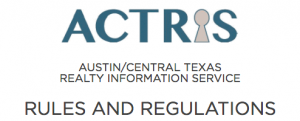Redfin Must Defend Copyright Suit Over Property Photos–Stross v. Redfin
 Stross is a photographer who licenses his photographs to real estate agents. He licensed the photos through ACTRIS, a multiple listing service that compiles listings into a database for use by brokers and realtors. ACTRIS users who upload their photos license the listings to ACTRIS, and authorize ACTRIS to further license out those photos. Those wishing to access content from ACTRIS can sign a Participant Content Access Agreement (PCAA), pursuant to which they can use data and photos. The PCAA requires compliance with certain rules, and limit use of the photos to a sale, lease, or valuation of property. The rules limit the use of materials in connection with sold houses. Participants may use sold house data for (1) estimate of a particular property for a particular client; and (2) to advertise their own past sales. Any other use is prohibited. The rules require participants to control dissemination of the content and limit the use of the content overall to purposes provided for in the rules and the PCAA.
Stross is a photographer who licenses his photographs to real estate agents. He licensed the photos through ACTRIS, a multiple listing service that compiles listings into a database for use by brokers and realtors. ACTRIS users who upload their photos license the listings to ACTRIS, and authorize ACTRIS to further license out those photos. Those wishing to access content from ACTRIS can sign a Participant Content Access Agreement (PCAA), pursuant to which they can use data and photos. The PCAA requires compliance with certain rules, and limit use of the photos to a sale, lease, or valuation of property. The rules limit the use of materials in connection with sold houses. Participants may use sold house data for (1) estimate of a particular property for a particular client; and (2) to advertise their own past sales. Any other use is prohibited. The rules require participants to control dissemination of the content and limit the use of the content overall to purposes provided for in the rules and the PCAA.
Stross licensed his photos through ACTRIS and noticed his photos of houses that had been sold displayed on Redfin’s website. According to Stross, the photos were used for reasons other than to for a limited estimate or to advertise past sales (i.e., Redfin allegedly used the photos outside the scope of the license). He sued Redfin for copyright infringement, alleging violations of some 1,800 images. He brought a claim for direct copyright infringement, contributory infringement, and copyright management information (CMI) violations for wrongly attributing the photos.
The district court granted summary judgment to Redfin, after initially denying both parties’ motions for summary judgment. The district court held that the fact that Stross was not a party to the Redfin-ACTRIS transaction precluded him from suing. It also held that Redfin had a valid license. (Check out my blog post on the district court ruling here: “Redfin Defeats Copyright Claims Due to MLS License Agreement“.)
The appeals court sweeps aside Redfin’s contractual-standing argument, noting that entitlement to sue depends on being the owner or exclusive licensee under the Copyright Act. Stross was not suing for breach of contract, and thus his status as a third-party beneficiary or privity are irrelevant.
As for Redfin’s license defense, the court says Redfin bears the burden of marshaling sufficient facts to demonstrate a valid license. Redfin falls short. There was a discrepancy on when Redfin became a participant in ACTRIS. The PCAA in the record is dated 2012, and this conflicted with ACTRIS’s testimony saying Redfin was a member as of 2010. The parties’ positions regarding the scope of the license similarly was similarly too disputed to warrant the grant of summary judgment. Redfin tried to rely on language in the ACTRIS agreement, arguing that when Stross granted ACTRIS a broad license, it granted that same license to all other ACTRIS users. Stross, on the other hand, says that Redfin can only use the materials in conformity with the PCAA (the participant agreement). The court says that the language of the ACTRIS does not unequivocally demonstrate an intent to benefit third parties such as Redfin. Moreover, interpreting the ACTRIS license in a manner that grants a broad license to all participant (similar in scope to the inbound license ACTRIS gets) renders the PCAA meaningless. The PCAA further reference restrictions in the rules and policies, and these can only be given some effect by reading the license participants are granted narrowly. Redfin also argued that only ACTRIS could enforce its rule violations, but the court rejects this argument as well.
In a footnote, the court notes that the district court’s terminology regarding the various license agreements was inaccurate. This explains my own confusion in blogging the district court opinion!
__
This is not a particularly controversial opinion, but I blogged the trial court’s ruling and felt obligated to mention the reversal.
The claims Redfin made are vaguely reminiscent of those Getty and AFP made in the Morel case (that twitter’s license terms granted them a broad license). Those were similarly unsuccessful. (“Court Definitively Rejects AFP’s Argument That Posting a Photo to Twitter Grants AFP a License to Freely Use It — AFP v. Morel“.)
While tough to tell from the record, Redfin’s processes regarding the licenses don’t seem totally buttoned up. That could turn out to be expensive. (See also VHT v. Zillow, currently on appeal in the Ninth Circuit.)
[Sidenote: the panel included noted tweeting judge (@JusticeWillett), who has since gone silent.]
Case citation: Stross v. Redfin, No. 17-50046 (5th Cir. Apr. 9., 2018)
Related posts:
Redfin Defeats Copyright Claims Due to MLS License Agreement
Anti-Scraping Lawsuits Are Going Crazy in the Real Estate Industry (Catch-Up Post)
Using Scraper to Harvest Records Isn’t Fraudulent Access Under CFAA–Fidlar v. LPS
Multiple Listing Service Gets Favorable Appellate Ruling in Scraping Lawsuit
512 Safe Harbor Applies to Content Submitted By Independent Contractors–BWP v. Examiner
